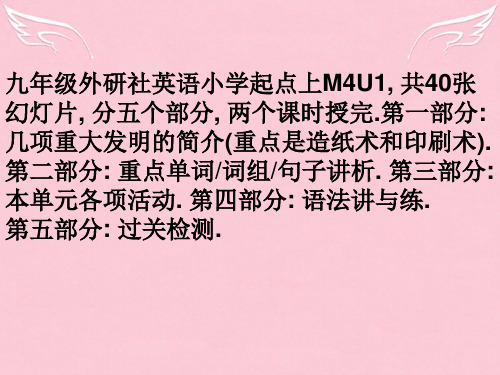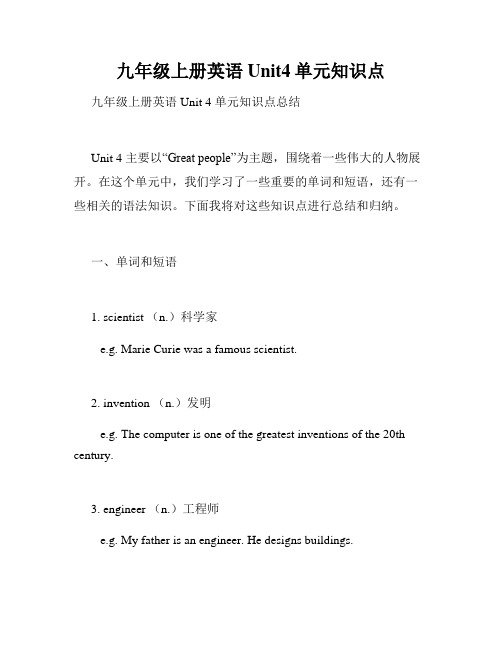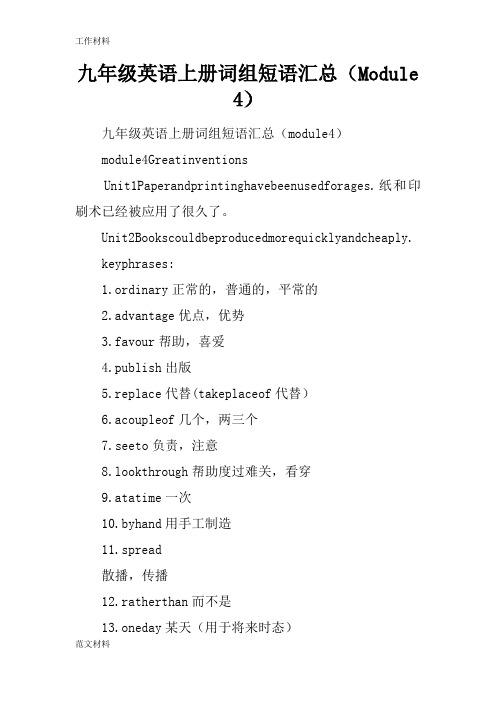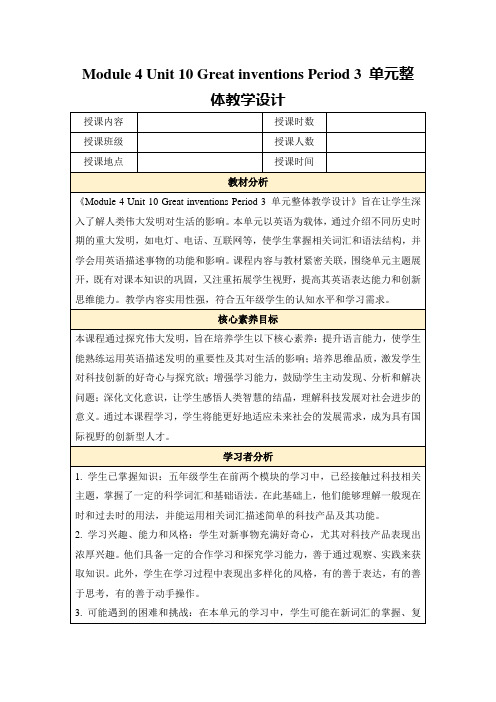九年级英语上册《Module 4 Great inventions Unit 1 Paper and printing have been used for ages》教案 外
九年级英语上册 Module 4 Great inventions课件 外研版

---Is an online magazine the same as an ordinary magazine? ---No, there are some differences. An online magazine is published on the Internet, and can be read using a computer. An ordinary magazine is published on paper.
printing
publishing(4)
making paper
printing
publishing
---How do people make paper, print and publish books today? ---They make paper, print and publish books by machine.
---Who was Edison? n. 发明家 ---He was an American inventor. ---What invention is this? ---It is called papermaking.
---What invention is this? ---It is called printing.
chargers 充电器 ---How do we charge the batteries? ---We use chargers.
---What inventions can you see in this picture?
---We can see a TV set, a பைடு நூலகம்ashing machine,
batteries battery(10) 电池 A: What are they called? B: They are called batteries. They are often used in the digital camera.
unit 4 Great Inventions (reading)

While-reading
b 1. In 1867, d 2. In 1879, c 3. In the early 19th
century,
a 4. At the start of the
20th century,
a. cars became popular.
b. Alexander Graham Bell invented one of the first practical.
Karl Benz Thomas Edison
Bisheng(毕昇)
What are these?
Inventions
Pre-reading
Look at the tittle and the picture of this passage, then answer the following questions. 1. What three inventions will this passage talking about? 2. Which inventions do you think is the greatest invention? Why?
The wheel
The telephoneen was it invented Life before the invention
Life after the invention
Don’t know.
A few thousand years ago.
1 How do great inventions help people?
They help people live a better life.
2 Which invention is probably the greatest in history according to the article? The wheel.
初中英语《Module4Greatinventions》单元教学设计以及思维导图

本单元是以发明为中心,围绕数码相机的使用、纸和印刷术的发明与 作用这一主题展开。发明创造对初中学生来讲既神秘又有吸引力,通 过本单元的学习使学生了解历史上的发明对人类生活的影响,从而激 发学生进行发明创造的愿望,引导学生刻苦学习、大胆想象,培养他 们的创造性思维。 通过对新发明的利弊分析,培养学生的思辨能力和英语表达能力。课 文列举了电子杂志与传统杂志之间的比较,以及电脑与书本的比较, 十分符合现实生活。教学中应结合学生生活实际情况,灵活掌握教学 过程,组织教学内容,丰富学生知识,拓展学生视野,培养学生用英 语独立思考的能力。 本单元的重点:(1)语言技能,通过听力练习,让学生感知文本,在 教师的指导下能回答简单的问题;能听懂有关发明的及其应用的对 话。 (2)语言知识:能正确使用下列词汇:advantage,digital,battery,
Step 2: Discussing(讨论) 1. 提出问题 Which type of magazine do you prefer,an ordinary one or an online one? Why? (What’s the advantage of „? ) 让学生进行 brainstorming(五分钟)。同学自由回答,老师对于任何回答都应该给 与鼓励,培养学生自由的思维和回答问题的习惯。 2. Do you want to know the teacher’s opinion? 教师叙述自己的观点, 提醒学生注意阐释原因的方法。教学 prefer„rather than Step 3: Listening 1. Read the words in the box. 2. Listen and check. 播放磁带,听选单词,再跟读单词, 对部分单词的用法作简单介绍。 Step 4: Listening and reading 1. 讨论:How would you borrow things from your parents? Will your parents lend the things you want to you? What will your parents ask you to notice when they lend the things to you? 2. 播放磁带录音,听并回答:⑴What favor did Tony ask his father for? ⑵What did Tony’s father ask Tony to do when he lent the digital camera to him? 3. 细读对话回答问题( Activity 5) 让学生熟悉课文内容,回答问题。 4. 仔细读对话,答疑。(如果时间允许,可以进行角色扮演朗读对话)
初三上册Module 4 Unit 2

4. write words on-make a book -in those days -at a time by hand ----
在…上写字 上写字 做成书 在过去 一次,每次 一次 每次 手工的 结果
as a result ---became very fat.
at a time as a result Ex. 1. He could even eat three hamburgers _________, ___________ he by hand 2. This picture is produced ___________, so it’s very expensive. 3. _______________ there were few people knew about computers. In those days 4. They tried to _____________ paper in order to ___________ . make a book write words on
e. Can books be replaced by computers?
Language Points
1. look through 浏览,温习 浏览, Eg. He looked through many books in order to find the correct answer. 2. with– without 带有 / 没有 带有… 没有… eg. He found a house with many trees around. He went to school without breakfast today 5. put… against 将…放进 刻进 放进/刻进 放进 hold… against 将…贴到 贴到 6. at the beginning of 在…初/ 开始时 初 after that 然后,之后 然后 之后 in a way 以…方式 方式 7. compare…. with…. 与….相比 , 与….相媲美 相比 相媲美 You can’t compare him with Tom, they’re different.
九年级上册英语Unit4单元知识点

九年级上册英语Unit4单元知识点九年级上册英语Unit 4 单元知识点总结Unit 4 主要以“Great people”为主题,围绕着一些伟大的人物展开。
在这个单元中,我们学习了一些重要的单词和短语,还有一些相关的语法知识。
下面我将对这些知识点进行总结和归纳。
一、单词和短语1. scientist (n.)科学家e.g. Marie Curie was a famous scientist.2. invention (n.)发明e.g. The computer is one of the greatest inventions of the 20th century.3. engineer (n.)工程师e.g. My father is an engineer. He designs buildings.4. reflect (v.)反射;反映e.g. The mirror reflects light.5. electricity (n.)电力e.g. We use electricity to power our homes.6. successful (adj.)成功的e.g. Bill Gates is a successful businessman.7. revolution (n.)革命e.g. The Industrial Revolution had a great impact on society.8. achieve (v.)实现;取得e.g. If you work hard, you can achieve your goals.9. feature (n.)特征;特点e.g. This new smartphone has many great features.10. create (v.)创造e.g. Beethoven created many beautiful symphonies.二、语法知识1. 形容词的比较级和最高级a. 基本形式:原级b. 比较级:原级+erc. 最高级:原级+este.g. brave(勇敢的)→braver(更勇敢的)→bravest(最勇敢的)2. 物主代词a. 形容词性物主代词:my, your, his, her, its, our, theirb. 名词性物主代词:mine, yours, his, hers, (ones) ours, theirs3. 定义性从句定义性从句用来对前面所提的名词或代词给出进一步的解释或说明。
九年级英语上册_Module_4_

Sure With pleasure! No problem! No way!
+sth. “意思是...” +从句 “意思是...” 2.mean “意味着,意思是”+to do sth. “打算/想要做某事” +doing sth. “意味着...” (1)The red light means “stop”. (2) I mean ________(go)tomorrow. to go (3)The bell means that the class is over. living (4)Accepting the job means ______(live)abroad.
ask you __ _______? 你能帮我个忙吗? 1.Can I____ ____ a favour
Language notes
类似的说法还有:
borrow from May I ______books _______you ?
11. ______v. 代替 replace John _____ ______Jack in the team . will replace
约翰将代替杰克在队里的位置。
see to 12. ________处理;照顾 ;注意
1. Can I ask a favour? “请您帮个忙行吗?”
请 (1)Please do me a fovour. 人 帮 (2)Can you do me a favour? 忙 (3)Can you give me a hand? 的 表 (4)Can you help me? 达 回 答
in one’s + 整十基数词复数 在某人几十岁时
在他50多岁时
in his fifties
【知识学习】九年级英语上册词组短语汇总(Module 4)

九年级英语上册词组短语汇总(Module4)九年级英语上册词组短语汇总(module4)module4GreatinventionsUnit1Paperandprintinghavebeenusedforages.纸和印刷术已经被应用了很久了。
Unit2Bookscouldbeproducedmorequicklyandcheaply.keyphrases:1.ordinary正常的,普通的,平常的2.advantage优点,优势3.favour帮助,喜爱4.publish出版5.replace代替(takeplaceof代替)6.acoupleof几个,两三个7.seeto负责,注意8.lookthrough帮助度过难关,看穿9.atatime一次10.byhand用手工制造11.spread散播,传播12.ratherthan而不是13.oneday某天(用于将来时态)14.dry使干燥,使变干15.popularity普及,流行16.lookthrough浏览17.beofadvantageto对。
有利gain/have/winanadvantageover优于,胜过takeadvantageof利用。
,占。
的便宜disadvantage不利条件18.bein/outoffavourwithsb.得到、失去某人的宠爱infavourof支持insb,'sfavour对某人有利的19.acoupleofmonths几个月20.seeabout考虑,处理seeoff为。
送行seeout送某人出去21.create创造(creator创造者creation创造,作品22.atatimebyhand手工一次23.atthebeginningof在。
的开始frombeginningtoend从头到尾inthebeginning当初,开始时24.knowledgeispower.知识就是力量。
Module4Unit10GreatinventionsPeriod3单元整体教学设计

板书设计
①重点知识点:
-伟大发明的定义
-发明的分类(物理发明、化学发明、生物发明、信息发明)
-发明专利的概念与作用
-科技创新的途径(技术创新、理论创新、跨学科创新)
-发明与创新的区别
-发明家素质(观察、思维、实践、毅力)
例题二:
题目:电话是如何工作的?它对人类社会有哪些影响?
答案:电话通过将声音转换为电信号,然后通过电线传输到接收端,再将电信号转换为声音,实现远距离通信。电话的发明极大地促进了人与人之间的沟通,缩短了时间和空间的距离,使得商务、家庭和朋友之间的联系变得更加便捷,对人类社会的发展产生了深远的影响。
例题三:
课堂小结,当堂检测
1.课堂小结:
在本节课中,我们深入探讨了伟大发明对人类生活的影响。通过学习电灯、电话、互联网等发明的历史背景、工作原理和应用,我们了解了科技发展如何改变我们的生活方式。同时,我们还学习了发明专利的概念、科技创新的途径以及发明家应具备的素质。这些知识不仅丰富了我们的科技视野,也培养了我们的创新思维和动手能力。
-《电灯的发明》:介绍托马斯·爱迪生发明电灯的过程及其对人类生活的影响。
-《电话的诞生》:讲述亚历山大·格拉汉姆·贝尔发明电话的历程,以及电话通信技术的发展。
-《互联网的发展》:介绍互联网的起源、发展历程以及它如何改变我们的工作和生活方式。
-《伟大发明家传记》:选取几位具有代表性的发明家,如爱因斯坦、牛顿等,介绍他们的生平事迹和伟大成就。
补充和说明:
1.描述性题目要求学生能够清晰地表达一个发明的历史背景、工作原理和影响。
2.分析性题目要求学生能够深入探讨一个发明对特定领域的影响,如教育、医疗等。
- 1、下载文档前请自行甄别文档内容的完整性,平台不提供额外的编辑、内容补充、找答案等附加服务。
- 2、"仅部分预览"的文档,不可在线预览部分如存在完整性等问题,可反馈申请退款(可完整预览的文档不适用该条件!)。
- 3、如文档侵犯您的权益,请联系客服反馈,我们会尽快为您处理(人工客服工作时间:9:00-18:30)。
Module 4 Great inventions
Unit 1 Paper and printing used for ages
Teaching Procedures:
Step one: Revision Recall what we the last Module.
Step two: Listening and vocabulary
1.Talking : What’s the advantage of an online magazine?
2. Listen and check the words as you
advantage, battery , borrow , camera, charge lend look after, online, photo, promise, same, turn off, turn on
3. Listen and read
Everyday English
Can I ask a favour? 帮忙,赏光
Anyway…谈点别的,另外
Here it is. 给你,在这儿
It doesn’t matter.没关系
I’ll see to that.我会处理的。
Is that clear? 清楚吗?懂了吗?
Promise! 我一定!
language Points
1)Paper and printing used for ages.
for ages ---- for (many) years好多年了.
eg. I ’t seen ’t been charged for a couple of months.
a couple of --- several 几个
eg. I made a couple of mistakes in the test paper.
3) I’ll see to it. 我来处理.
see to sb. sth.= look after, deal with “处理, 照顾, 关照”
eg. Mother is ill. I ’t be….
promise to do that..= make a promise to dothat 答应, 许诺作某事
Promise!= I promise to do that.我答应!
5) turn on ----打开 turn off ----关闭
turn up -----开大 turn down ---关小
eg. Don’t forget to ___________the light when you leave the room.
Please ___________the TV, the football is beginning.
Would you please ________it ______ a little? I can’t . Underline the wrong information
Tony wants to borrow paper. Tony wants to take some photos of the school dance and the basketball match. Tony’s dad is it off. He promises Tony to look after it.
5. Answer the questions
Why does Tony want to borrow the school visit to the museum
next week.
2. Why does Tony’s dad ask “ What’s wrong with an ordinary magazine?”
Because ordinary paper magazine.
3. Does Tony think books can be replaced by computers?
He’s not sure. He thinks that maybe they can
4. How will Tony look after the camera?
He won’t lend it to others and ’t leave it at school.
6. Find the sentences in the conversation which mean…
1.I will do what you tell me to.
2.Why don’t you continue to publi sh the magazine on paper?
3.Could you do something for me?
4.Do you understand me?
5.It’s not a problem. I’ll charge the battery.
6.Changing the subject, will you lend me your camera? Grammar Points
Will (won’t_) + be +动词的过去分词为一般将来时的被动语态
+ 动词的过去分词为现在完成时的被动语态
情态动词+ be + 动词的过去分词为情态动词的被动语态
Summary: 各种时态的被动语态构成
一般现在时:S+ amis are + done
一般过去时:S+ waswere + done
一般将来时:S+ will + be + done
情态动词:S+canmaymustshould+be+done
现在进行时: S+ am is are + being+ done
过去进行时: S+ waswere + being+ done
现在完成时:S+ + done
Pronunciation and Speaking
7.Listen to the sentences
8.Work in pairs. Talk about the advantage of the inventions. Our life changed by cell phones bikes TVs because.. Homework:
1.Finish work book 1-3
2.Write a passage about one of the inventions we talked about。
